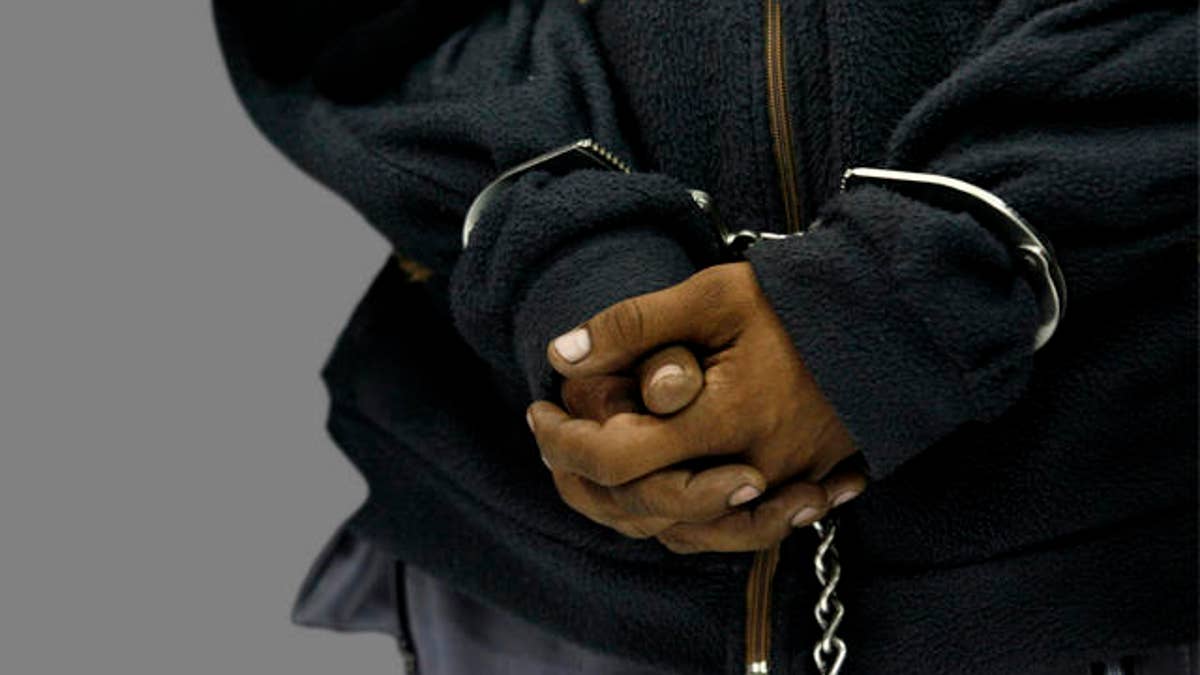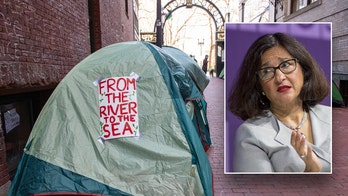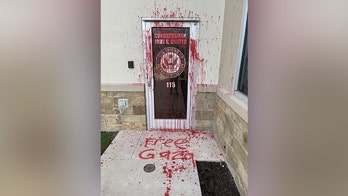
The hands of Raul Ortiz Gonzalez, an alleged member of kidnapping gang "Los Rojos," are handcuffed as he is presented to the press after his arrest in Mexico City, Wednesday, July 29, 2009. Ortiz is a suspect in the 2007 kidnapping and murder of Silvia Vargas. (AP Photo/Marco Ugarte) (AP2009)
Homeland Security officials say that they are prepared to make Massachusetts join a federal program called Secure Communities that the governors of two other states have rejected, according to the Boston Globe.
In recent days Gov. Deval Patrick, a Democrat, said that Massachusetts would not join the program, which increasingly has come under fire from critics who say that it is resulting in the arrest and deportation of non-criminal immigrants – a departure, they say, from its official mission of targeting violent criminals.
But citing an unnamed DHS official, the Boston Globe report said rejection of the Secure Communities program cannot prevent the federal government from its plan to implement it nationwide by 2013.
The official, according to the Globe, said that Patrick cannot impede the use of data in the system that the Secure Communities program contains.
“It might delay the statewide implementation a little bit, but I think our position is we will continue to expand it when we are ready, where we are ready,’’ the official said in a telephone interview from Washington, D.C., according to the Globe.
Under the Secure Communities program, the FBI automatically shares fingerprints with DHS to check arrestees' immigration status.
Last year, Patrick had indicated that he would sign on to Secure Communities, which exists in 42 states. It is active in Boston, where it was launched in 2006 by the DHS on a pilot basis.
But a backlash has grown against Secure Communities.
The DHS Office of Inspector General said recently it will be conducting an investigation next year of Secure Communities.
In a May 10 letter to California Rep. Zoe Lofgren, a Democrat who has expressed concerns about the program, acting Inspector General Charles K. Edwards said he was planning a review “to determine the extent to which ICE uses the program to identify and remove dangerous criminal aliens from the United States.”
Lofgren is pushing to have the review done this year.
And recently, the Democratic governors of Illinois and New York said they would no longer participate in the program. Both said the program seemed more detrimental than helpful as far as public safety.
They said the program was resulting in the deportation of people who had not been convicted of crime and were not a public safety threat. They said the program instead had seemed to alienate police from the immigrant community, discouraging witnesses and victims from such populations from approaching or cooperating with police.
In a letter this month to the DHS agency that handles deportations, the Bureau of Immigration and Customs Enforcement, or ICE, Massachusetts Public Safety Secretary Mary E. Heffernan said that about half of the people deported under Secure Communities were not criminals.
Boston police say the checks are not used to enforce federal immigration laws but to identify criminals wanted by federal authorities.
The program, now being used in 42 states, was adopted in Boston in 2006, when the federal government launched it as a pilot program. The city is the only Massachusetts jurisdiction in the program.
DHS officials say on their website that the program is “an effective tool” that tracks down foreign nationals tied to such crimes as “homicide, rape, kidnapping” and helps prevent their “being released back into communities” by making sure they continue to be held – under immigration custody – after completing their sentence, and sent back to their country.
But immigration officials also defend the detention and deportation of non-criminals who are found to be living here illegally, which is a civil offense.
Groups that support strict immigration enforcement say the U.S. government is correct to track down and deport people who are in the country illegally, if they have not committed crimes.
In a statement on its website, the Federation for American Immigration Reform, or FAIR, based in Washington D.C., defended the program.
"While Secure Communities is specifically designed to identify and remove criminal aliens, there is no reason why illegal aliens without criminal convictions should not also be deported," it said.
"Contrary to the apparent position of. . .advocates for illegal aliens, illegal aliens do not need to have committed other offenses in order to be removed from the country."
Immigration advocates say they will keep fighting to keep Secure Communities out of their state.
"In reality, we know that this is a federal program, but that doesn't mean that local governments and immigrant-rights groups can't do advocacy work to prevent this from being implemented in 2013," said Patricia Montes, the executive director of Centro Presente, a state-wide advocacy group that was one of the first to protest Secure Communities.
Montes said that programs like Secure Communities point to the need for comprehensive immigration reform at the national level.
This story contains material from The Associated Press. Tanya Pérez-Brennan, a freelance journalist based in Boston, contributed to this story.
Follow us on twitter.com/foxnewslatino
Like us at facebook.com/foxnewslatino




